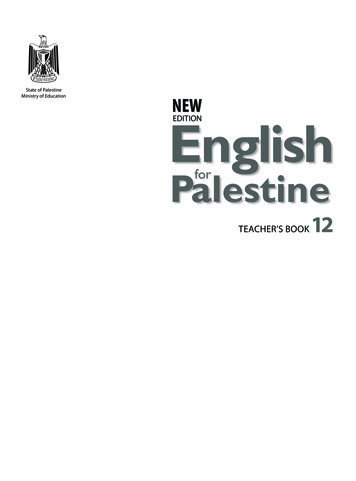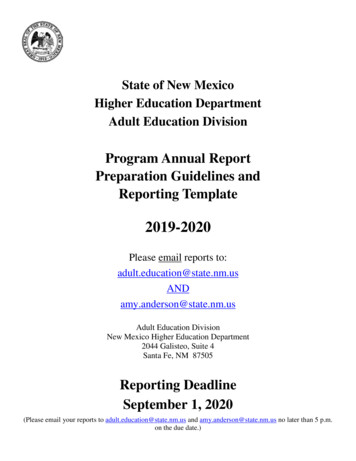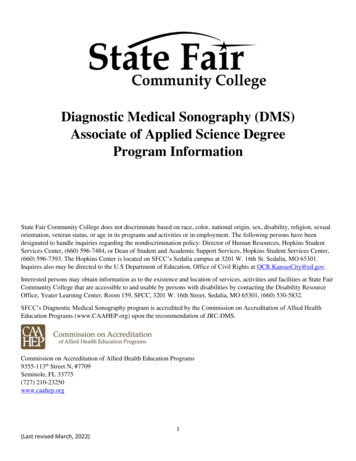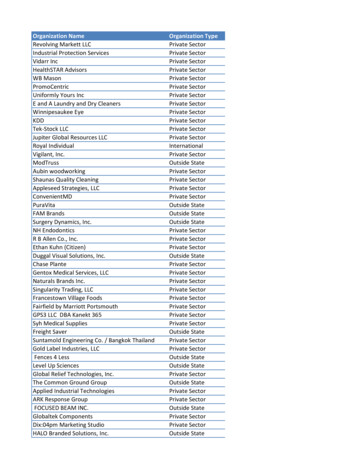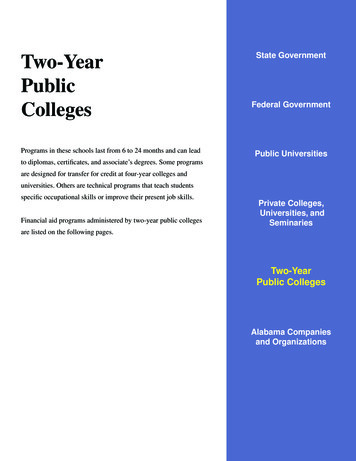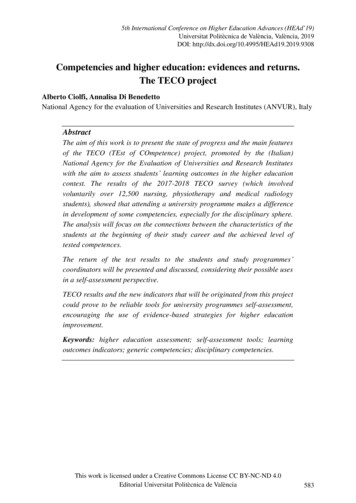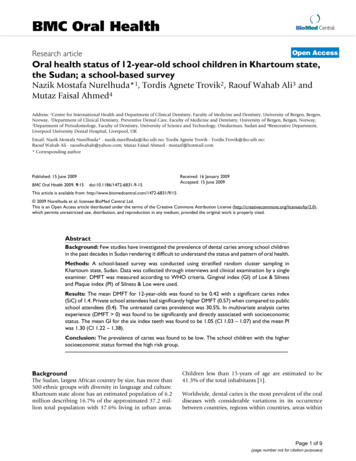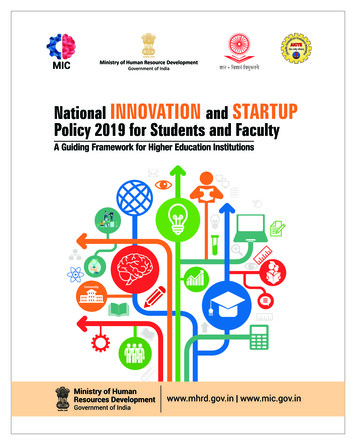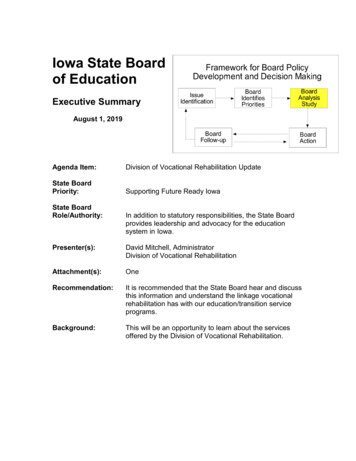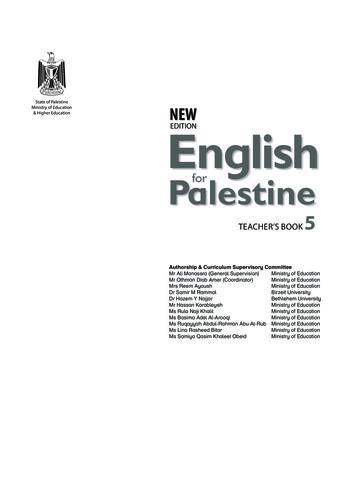
Transcription
State of PalestineMinistry of Education& Higher EducationNEWEDITIONEnglishforPalestineteacher’s book5Authorship & Curriculum Supervisory CommitteeMr Ali Manassra (General Supervision)Ministry of EducationMr Othman Diab Amer (Coordinator)Ministry of EducationMrs Reem AyoushMinistry of EducationDr Samir M RammalBirzeit UniversityDr Hazem Y NajjarBethlehem UniversityMr Hassan KarableyehMinistry of EducationMs Rula Naji KhalilMinistry of EducationMs Basima Adel Al-ArooqiMinistry of EducationMs Ruqayyah Abdul-Rahman Abu Al-Rub Ministry of EducationMs Lina Rasheed BitarMinistry of EducationMs Samiya Qasim Khaleel ObeidMinistry of Education9780230415591 text.indd 118/07/2013 14:36
Authorship Supervisory Committee (original edition)Dr Hazem Y Najjar (Head)Bethlehem UniversityDr Salem AweissBirzeit UniversityDr Omar Abu Al-HummosAl-Quds UniversityMr Othman Diab Amer (Rapporteur)Ministry of EducationEnglish Language Curriculum Team (original edition)Dr Hazem Y NajjarBethlehem UniversityDr Salem AweissBirzeit UniversityDr Omar Abu Al-HummosAl-Quds UniversityDr Odeh J OdehAl-Najah UniversityDr Samir M RammalHebron UniversityDr Nazmi Al-MasriGaza Islamic UniversityMs I’tidal Abu HamdiyahMinistry of EducationMs Majedah DajaniMinistry of EducationMr Imad JabirHebron UniversityMr Suhail MurtajaMinistry of EducationMr Othman Diab Amer (Rapporteur)Ministry of EducationMacmillan EducationBetween Towns Road, Oxford OX4 3PPA division of Macmillan Publishers LimitedCompanies and representatives throughout the worldISBN 978-0-230-41559-1Text, design and illustration Macmillan Publishers Ltd 2012Written by Wendy ArnoldThe author has asserted her rights to be identified as the author of this workin accordance with the Copyright, Designs and Patents Act 1988.First published 2012All rights reserved; no part of this publication may bereproduced, stored in a retrieval system, transmitted in anyform, or by any means, electronic, mechanical, photocopying,recording, or otherwise, without the prior written permissionof the publishers.Note to TeachersPhotocopies may be made, for classroom use, of pages 140–144 withoutprior written permission of Macmillan Publishers Limited. However, pleasenote that the copyright law, which does not normally permit multiplecopying of published material, applies to the rest of this book.Designed by Melissa Orrom SwanCover design by Macmillan Publishers Limited 2012Commissioned images by James Maroney p33.Illustrated by Claire Mumford and Simon RumbleThe author would like to thank the publishing team at Macmillan, as wellas all the committee in Palestine who have tirelessly given their time to thisproject. And a special mention to Mrs Reem Ayoush for her extraordinarysupport and expertise.Any views expressed in this publication are those of the PalestinianNational Authority and represented by the Publisher on behalf of theAuthority.Printed and bound in Palestine by A R Hijjawi & Sons2017 2016 2015 2014 201310 9 8 7 6 5 4 3 29780230415591 text.indd 218/07/2013 14:36
ContentsIntroduction . . . . . . . . . . . . . . . . . . . . . . . . . . . . . . . . . . . . .Course components . . . . . . . . . . . . . . . . . . . . . . . . . . . . . . .44Methodology1 Developing listening and speaking skills . . . . . . . . . . . . . . . . 42 Developing reading skills . . . . . . . . . . . . . . . . . . . . . . . . . . . . 53 Developing writing skills . . . . . . . . . . . . . . . . . . . . . . . . . . . . 5Classroom management1 Making periods enjoyable and effective . . . . . . . . . . . . . . 52 Revising . . . . . . . . . . . . . . . . . . . . . . . . . . . . . . . . . . . . 63 Testing . . . . . . . . . . . . . . . . . . . . . . . . . . . . . . . . . . . . . 64 Using language games . . . . . . . . . . . . . . . . . . . . . . . . . . 65 Using songs, chants, rhymes and tongue twisters . . . . . . . 66 Language games . . . . . . . . . . . . . . . . . . . . . . . . . . . . . . 67 Other resources . . . . . . . . . . . . . . . . . . . . . . . . . . . . . . . 7Language overview . . . . . . . . . . . . . . . . . . . . . . . . . . . . . . .8Teacher’s notesUnit 1 New friends . . . . . . . . . . . . . . . . . . . . . . . . . . . . . 10Unit 2 Our country . . . . . . . . . . . . . . . . . . . . . . . . . . . . . 18Unit 3 Mini-Olympics . . . . . . . . . . . . . . . . . . . . . . . . . . . 26Unit 4 Holidays in Palestine . . . . . . . . . . . . . . . . . . . . . . . 34Unit 5 Revision . . . . . . . . . . . . . . . . . . . . . . . . . . . . . . . . 42Unit 6 Basketball . . . . . . . . . . . . . . . . . . . . . . . . . . . . . . . 46Unit 7 Things around us . . . . . . . . . . . . . . . . . . . . . . . . . . 54Unit 8 What I like doing and why . . . . . . . . . . . . . . . . . . . 62Unit 9 Revision . . . . . . . . . . . . . . . . . . . . . . . . . . . . . . . . 70Unit 10 Ben and Amy’s holiday . . . . . . . . . . . . . . . . . . . . . 74Unit 11 The wolf’s shoes . . . . . . . . . . . . . . . . . . . . . . . . . 82Unit 12 Omar and Rania’s visit to Qalqilya . . . . . . . . . . . . . 90Unit 13 Ben’s blog . . . . . . . . . . . . . . . . . . . . . . . . . . . . . . 98Unit 14 Revision . . . . . . . . . . . . . . . . . . . . . . . . . . . . . . 106Unit 15 The ‘Best of Palestine’ tour . . . . . . . . . . . . . . . . . 110Unit 16 Can I use it? . . . . . . . . . . . . . . . . . . . . . . . . . . . 118Unit 17 What will happen? . . . . . . . . . . . . . . . . . . . . . . . 126Unit 18 Revision . . . . . . . . . . . . . . . . . . . . . . . . . . . . . . 134English test notes . . . . . . . . . . . . . . . . . . . . . . . . . . . . . 138Grade 5 English Test . . . . . . . . . . . . . . . . . . . . . . . . . . 14039780230415591 text.indd 318/07/2013 14:36
IntroductionCOURSE COMPONENTSEnglish for Palestine Grade 5 consists of the followingcomponents: 2 Pupil’s Books (5A and 5B), each containing both languagepresentation and practice material 1 Teacher’s Book 122 Flashcards 14 Posters 2 Audio CDsObjectivesThe objectives of Grade 5 are: the introduction of high-frequency English words to introduce simple and increasingly more complex keygrammatical structures to provide opportunities for children to engage inmeaningful and authentic activities in English to practise and extend children’s abilities in the key skills oflistening, speaking, reading and writingFor details of how the course covers language unit by unit, seethe Overview on pp. 8–9.The Pupil’s BookThere are two Pupil’s Books for Grade 5, covering 18 units inthe course of a year. Pupil’s Book 5A contains Units 1–9; oncethe class has completed this, it moves on to Pupil’s Book 5B,which contains Units 10–18.Each Pupil’s Book contains seven units of new material: thesepresent new vocabulary and structures and provide practicefor listening, speaking and early literacy skills. Two revisionunits give children the opportunity to review and furtherpractise this language.The Pupil’s Book is a combination of a traditional Pupil’s Bookand Workbook. Each unit contains material for eight teachingperiods.Each unit is based on a theme, allowing the new languageto be taught in context, e.g. Mini-Olympics and Holidays inPalestine. The themes have been taken from the Palestinecurriculum to meet the needs and interests of children of thisage. In addition, well-known stories have been included, theseeither have a moral or are true with a message.The Teacher’s BookComprehensive notes are supplied for each period, to helpthe teaching be as effective as possible and to ensure thatteaching time is used efficiently. The notes for each unitcontain a summary box at the start, clearly detailing thelearning aims and the key language covered, as well as listingthe materials required so that you can prepare lessons inadvance. Timings for each activity are supplied as a guide.The Posters and FlashcardsThe visual stimuli of the posters and flashcards provide afun and effective means of introducing, consolidating andpractising new language, as well as reviewing known languagein a new context.Each period begins with poster activities. Flashcards and wordcards are used for follow-up work, and later in simple games(matching, classifying, memory work, etc.) to give a range ofopportunities for review and extending the children’s knowledge.The Audio CDsThe Audio CDs contain native-speaker recordings of all thelistening texts and dialogues in the Pupil’s Books, to give aclear model for all language structures, key vocabulary andletter sounds. The recordings are designed to encourage thechildren’s input, giving them plenty of opportunity to developtheir listening and speaking skills.METHODOLOGYEnglish for Palestine Grade 5 takes a step-by-step approach.Children hear the words, then move on to saying them. Theypractise recognising letters with listening games, e.g. I spy,then move on to writing them. It is very important for literacythat the children make the link between the sounds they hearand letter combinations.Children have different learning styles. Visual learners learnbest when they have lots of pictures, real items, people’sfaces and gestures as stimuli. Auditory learners learn mosteffectively from hearing new language and being given lots ofopportunity to speak. Kinesthetic learners benefit from linkinglanguage to action (this can be a challenge in the classroom).English for Palestine has been designed to meet all theselearner needs and to motivate learners of different abilities. Inaddition, concept checking questions which both the teacherand audio recordings provide, start to develop the children’sthinking from low to high order thinking. This developmentof thinking skills helps the children to use more language inincreasingly complex ways.1 Developing listening and speaking skillsChildren should be given every possible opportunity tohear English spoken and to speak it themselves, so that49780230415591 text.indd 418/07/2013 14:36
they can become fluent and accurate English speakers.Each period of English for Palestine provides opportunitiesfor developing both fluency and accuracy.Fluency activities: Fluency refers to the ability to get themessage across: the message is not necessarily error-free,but it is communicated. Try to find opportunities for informalinteraction in English with the children, so that they don’t feelscared to speak English: making errors here isn’t important.Accuracy activities: Accuracy refers to the ability to produceerror-free English. Each unit in the course contains accuracyactivities, either grammar- or vocabulary-based. At thepresentation stage of the period, it is important that youprovide a good model of accurate English and that the childrenrespond accurately. Use the recordings to help you. It is at thisstage that you should correct children’s errors, in language orpronunciation.Complexity activities: Complexity refers to the ability tostart to use English in ways which are not necessarily in thecoursebook. Encouraging children to be creative with the useof English is crucial for them to become independent users oflanguage.Oral interaction in the classroomIt is important to vary the pattern of interaction in theclassroom. If you constantly address the whole class, you mayfind that the more confident children are doing all the talkingin response, while the quieter children stay silent. Remembersometimes to address questions and comments to individualchildren or small groups. Also use pair work, a very effectiveway of encouraging the children to practise speaking English.Drilling is also used in the course: here the whole class repeats/says a word or phrase together or in groups. This allows lessconfident children to join in without feeling intimidated.2 Developing reading skillsGrade 5 builds on the work done in Grades 1–4, with moreopportunity to read sentences and simple texts.Word cardsAs the children practise reading new words, you will find ituseful to create word cards, that you can use again and again.– Make the word cards A4 size, the size of photocopy print paper.– The writing needs to be big enough for the children at theback of the class to read.– Use a thick black pen so that the words are clear.– Use the same writing style as the children are learning (seeTeacher’s Books Grades 1–3 pp. 120–1 for a word cardhandwriting model – you can trace over the letters inorder to master the style).Independent learningIn Grade 5 the children continue to develop into moreindependent learners who can think and act for themselves.In the My dictionary section at the end of the Pupil’s Book theywrite the Arabic translation in the spaces supplied, creatingtheir own bilingual resource for memorising and reviewing allthe new vocabulary in the Pupil’s Book, plus a range of relatedvocabulary items that they are already familiar with. Encouragethem to keep this up to date and to use it regularly.3 Developing writing skillsIn Grade 5 there are more opportunities to write both wordsand simple sentences. Use the Look, Say, Cover, Write, Checkmethod for accurate spelling. In this method children usea copybook for practising their spelling (the list of wordsis given at the end of each Lesson 7 in a unit). They writethe words in the left side of their copybook in a column.They then LOOK at the words in turn, SAY the word, COVER(fold the page in half vertically), WRITE the word and thenuncover and check that they have spelt the word correctly.This is a tried and tested method that will help a lot of thechildren spell accurately.A photocopiable writing frame is supplied on Teacher’sBooks Grades 1–3 p. 124. At the end of each unit, thechildren will be asked to produce a piece of writing fordisplay purposes. Explain that it will be displayed in theclass and/or they will take it home for their family to see.Encourage them to do their best writing, remembering toform letters correctly, to make them the correct size and tospace them appropriately. The children will be motivated towrite very carefully when they know the work is for display.It will also encourage them in their learning to producesomething that they feel proud of.CLASSROOM MANAGEMENT1 Making periods enjoyable and effective– Activate existing knowledge: This makes us morereceptive to additional information. It is very easy to takeadvantage of this with young children. When you first starta new unit, don’t let the children open their books. Tell themthe topic of the unit, and ask a question related to it, e.g. fora unit called The ‘Best of Palestine’ tour, ask where they thinkthe family would take visitors in Palestine and what theywill see and do, etc. When the children open their books tostart the unit, they will have a context in which to learn thenew language.– Use visual material effectively: There is a large amount ofvisual material in the Pupil’s Book, which can be exploitedin a number of ways. Use it to show the meaning of newvocabulary items; visual literacy is a very important partof language learning. Pictures can also be used beforean activity to orientate the children, to activate existingknowledge and to predict the language or outcome. Alsoteach children to look at pictures for clues in order tocomplete an activity.59780230415591 text.indd 518/07/2013 14:36
– Monitor and feedback: Working with a large class canmake checking work a challenge. However, it is essential tomonitor and provide feedback to encourage the childrenand to identify areas of weakness that you need to review.At the end of each activity, there should be a feedbackstage, during which correct answers are confirmed(including alternative correct answers, if any) and incorrectanswers are discussed.– Keep children motivated: The course contains a widevariety of activities to keep the children engaged andmotivated. In addition, we include ideas for games.2 RevisingTo ensure that teaching is effective, it is essential that newlanguage items are revised on a regular basis. For thisreason language is revised in activities both within theunits and in the Revision units throughout the course. TheTeacher’s Book also includes suggestions for revision workat the start and end of periods.3 TestingAs well as using the formal test at the end of Grade 5, bearin mind that it is useful to test children informally on anongoing basis: it will help you identify areas of weaknessthat you can revisit in subsequent lessons. Remember togive positive feedback as much as possible, as this will helpdevelop children’s confidence.4 Using language gamesLanguage games are an enjoyable way of revising andreinforcing new language. They help to motivate children,especially when there is an element of competitioninvolved. Games are used throughout the course.5 Using songs, chants, rhymes and tongue twistersYou will find a combination of songs, chants, rhymes andtongue twisters in Grade 5. These are all very importantactivities for developing language fluency, stress andintonation patterns as well as being FUN!6 Language games1 Teacher SaysAsk the class to stand. Give a short instruction, e.g. Teachersays touch your nose./Teacher says point to something yellow.(You can replace Teacher with your own name or a child’sname.) The children listen and follow the instruction.However, if you miss out Teacher says at the beginning ofthe instruction, e.g. Touch your nose./Point to somethingyellow, they shouldn’t follow the instruction. If they do, theysit down. The winner is the last child left standing. You canmake it harder by saying the instructions very quickly oneafter the other.2 I SpyYou can play this game using the classroom, the poster orflashcards. Say, e.g. I spy something yellow./I spy somethingbeginning with w. The children have to look round the room/on the poster/on the flashcards and guess what the thingis, e.g. a yellow ball, a window, etc. Once children are familiarwith the game, they can play in pairs/small groups, takingturns to say I spy This is a good game for practisingspeaking and vocabulary.3 Number sequencesPut the children in pairs or groups. Tell them to count to 50in fives, with each person taking it in turn to say a number.Repeat, this time starting with a different child. Alternatives:count backwards; count in tens.4 Memory gameChoose a set of pictures (vocabulary or sentences). Give thechildren 1 minute to look at the pictures in Activity 1. Theythen close their books. Challenge the class to remember allthe pictures as quickly as possible: time them. They need toget the whole sentence correct before you accept it. Repeatto see if the children can recall the routines more quickly.5 What’s missing?Display a set of flashcards. Ask the children to close theireyes. Remove a flashcard. The children open their eyesagain. Ask What’s missing? to elicit the missing card. Repeatseveral times. You can make the game more challengingby not replacing the missing card, so that each time thechildren have to remember more items. Continue until theycan say all the words without any visual prompts.6 Chinese whispersPut the class into teams, each sitting in a row going from theback of the class to the front. Give board pens/chalk to thechildren at the front of the teams. Write a message on a paperfor each team (it could be a time, an instruction, a phrasesuch as a black sweater, etc.). Hand out the papers to theperson at the back of each team. They look without showinganyone. The aim of the game is to get the information to theperson at the front of the team: each team member whispersthe message to the person next in line until it reaches theperson at the front. He/She then whispers it to you or writes iton the board. The team which finishes first – and is correct –is the winner. Repeat several times.7 CharadesPut the class into two teams. Each team takes it in turn tosend a person to the front. That person mimes an animal. His/Her team has 10 seconds to name the animal. A correct guesswins a point. If they get it wrong, the other team has a go atanswering. This game can also be played using playgrounditems, jobs or any other vocabulary that can be mimed.69780230415591 text.indd 618/07/2013 14:36
8 BingoReview a vocabulary set with the class, e.g. parts of thebody. The children then choose six items and write or drawone in each box of a bingo grid. Place the word cards facedown. Choose different children to pick up one at a timeand say the word on it. The children cross out the wordsin their grids as they hear them read out. The first personto cross out all his/her words shouts Bingo! This game canbe played with any large vocabulary set (you need at least10 available items so that all the children don’t choose thesame ones), including numbers, colours, clothing, etc.9 Shark attackChoose a word and say the topic (e.g. It’s a number.). Don’tsay the word. Write on the board a line for each letter.Explain that the aim of the game is to work out the word byguessing letters. For each wrong letter, you will draw a lineof a shark. The children need to work out the word beforethe shark is complete. Elicit letters from the children. If theletter is in the word, write it in; if not, draw a line of theshark and write the letter at the side of the board. The childwho works out the answer can write up the next prompt.This game can be used with any vocabulary set.10 Reading running raceUse the text from Lesson 1 of any unit. Preparation:enlarge the text or write it out again on A3 size paper(2 x A4 or regular photocopy size). This text has all thetarget vocabulary for the unit. Write 6 (or more) questionsbased on the text (you could use some of the questionsin this Teacher’s Book or the riddles). Write the questionson a piece of coloured paper (you will need 4–5 differentcoloured papers so you can keep track of the teams). Giveeach group a piece of scrap paper to write their answers.They should write their group colour on the front and writenumbers 1 to 6 down the left side.Playing the game: put the class into 4–6 groups. Tell eachgroup their colour (this is the same as the coloured paperwith questions). Give the instructions: each person in thegroup will go to the front of the class and take one questioneach, they go to the text on the walls (or in the corridor – ifyou use the outside of the classroom then make sure thechildren know they must be quiet) and find the answersfor their question. They go back to their table and write theanswer with the number of the question. The next person inthe group returns to the front of the class to collect questionno. 2. NOTE if they do not return with question no. 1 paperthey do not get question no. 2. The first group to finish sitsdown and put their hand up. The other groups have oneminute to complete and then the game is finished. Elicit theanswers and each group marks their own paper. The winneris the group with the most correct answers.11 Noughts and crosses (Tic Tac Toe)Preparation: prepare 12 questions based on a unit text.You can either just revise the questions you will find in thisTeacher’s Book (including riddles) or make up your own. Putthe class into two groups. They will play against each other.Draw the game frame on the board.Each group forms smaller groups of 3–4 children. Eachsmaller group will be given a chance to answer the questions.Toss a coin to see who goes first (head up goes first). Ask thequestion, if it is correct then that group chooses whetherthey are ‘noughts’ or ‘crosses’ and where to put the first mark.Continue playing the game until there is a winner, ie. onegroup gets a line of 3 in a row/column or diagonal.12 When? (to practise tenses)This is a wonderful activity to practise irregular verbs in thepresent and past. Show the children how to play the game.Their bodies are the different times: ankles (past) and waist(present). Start by saying the present tense go and put yourhands on your hips. Encourage the children to touch theirankles and say went.Repeat (depending on target vocabulary or revising):be – wasfly – flewbreak – brokehave – hadbuy – boughtmake – madecome – cameread – read (red)drink – drankrun – rando – didsit – sateat – atetell – toldfind – foundtake – took7 Other resourcesInternetYou can find further teacher support, including ideas forextra activities and for developing teaching skills, on thewebsite onestopenglish.com. There is also a website forthis course where you can download posters, flashcards,audio (MP3) materials. You could make your own materialsfrom the downloads available:www.englishforpalestine.comPassword: Palestine79780230415591 text.indd 718/07/2013 14:36
English for Palestine Grade 5 Language overviewPupil’s Book 5AUnit and contextsLanguage1 New friends– To greet and introduce yourself– To ask and answer questionsabout yourselfclass, parent, twin, race, work, art, email, film, cinema, internetWhat do you like doing? I like ing.2 Our country– To identify places of interest– To identify what you can do inplaces of interestphoto, stadium, building, father, mother, people, cable car, famous, valley, hiking, boat,wheelPresent continuous: What are you doing? I’m -ing.Review: hobbies, likesReview: places of interest in Palestine and England3 Mini-Olympics– To use ordinal numbers to showposition– To understand the meaning oflength using metres– To understand the meaning oftime using minutesfirst, second, third, fourth, fifth, sixth, seventh, eighth, ninth, tenth, eleventh, twelfth, metre,minutePresent continuous: He’s swimming fast.Present simple: She finishes the face in one minute.4 Holidays in Palestine– To link the month of the year toordinals– To identify when holidays occur– To link weather to months of theyearJanuary, February, March, April, May, June, July, August, September, October, November,December, month, yearPresent simple: January is the first month. I have holidays in month. There are seven daysin the week. The months of month are in season. It’s weather in month.5 Revision – The rabbit and thetortoise– A story with a moralRevision of the language in Units 1–46 Basketball– To link comparatives to peopleat different stages in their livesfat, thin, heavy, light, young, high, low, wide, strong, throw, long, cleverComparatives: is thin. is thinner than Review: sports day activitiesReview: days of the week, seasons, weather, activities in different seasonsReview: adjectives7 Things around us– To practise comparatives– To introduce superlatives– To link superlatives to previouslyintroduced topics8 What I like doing and why– To practise comparatives andsuperlativesbeautiful (more beautiful, most beautiful), expensive (more expensive, most expensive),cheap (cheapest), news, more, most, cool, warm, which, dirty, clean, TV programmeSuperlatives: is the most beautiful. Which is the ? Which is than ? Who’s the ?Review: adjectives, months of the year, classroom itemsexciting, interesting, answer, ask, give, or, better, best, idea, worse, worst, healthyComparatives and superlativesReview: hobbies, sports, food, holidays9 Revision – The cats and themonkey– A story with a moralRevision of the language in Units 6–889780230415591 text.indd 818/07/2013 14:36
Pupil’s Book 5BUnit and contexts10 Ben and Amy’s holiday– To talk about events in the pastLanguagewedding, marry, look like, princess, also, about, hour, all, again, for, by, palaceWhat did you do?Review: adjectives, places, activities11 The wolf’s shoes– To practise past simple with negative andinterrogative forms– A story with a moralwolf, hear, road, hide, both, look for, with, laugh, end, greedy, nothing, angry12 Omar and Rania’s visit to Qalqilya– To practise the past simple with regular andirregular verbsany, fruit, vegetable, plant, then, some, us, last, those, out, them, movePast simple: I went, drive, ate, visited, likedReview: simple past verbsReview: activities, adjectives13 Ben’s blog– To practise past simple (regular andirregular)tell, blog, him, break, hospital, busy, nice, moon, mirror, too, place, afterWhat happened to Ben? What did Ben do?Review: activities, hobbies14 Revision – The princess and the threefriends– A story with a moralRevision of the language in Units 10–1315 The ‘Best of Palestine’ tour– To use going to for future plansnext, tour, arrive, meet, travel, ruin, before, float, leave, near, tomorrow, ourWhen are you going to have a holiday? What are you going to do there?Review: days of the week, time of the day, places in Palestine, activities16 Can I use it?– To introduce modal can for permissionlaptop, screen, turn on, use, click, choose, borrow, press, button, try, remote control,mobile phoneCan I play a game? Can I try your mobile phone?Review: adjectives, hobbies, activities17 What will happen?– To introduce and practise the futuresimple tenserobot, rescue, future, everyone, spacesuit, planet, spaceship, scientist, science lab,outer space, growWhat will happen in the future? There will be robots.Review: activities, clothes18 Revision – A rescue– An authentic storyRevision of the language in Units 15–1799780230415591 text.indd 918/07/2013 14:36
U NIT1New friendsLANGUAGE DEVELOPMENT 7 minsAims to greet and introduce yourself;
English for Palestine Grade 5 consists of the following components: 2 Pupil’s Books (5A and 5B), each containing both language presentation and practice material 1 Teacher’s Book 122 Flashcards 14 Posters 2 Audio CDs Objectives The objectives of Grade 5 are: the intr
